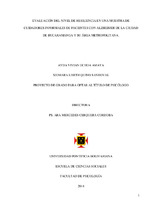| dc.contributor.advisor | Director. Cerquera Córdoba, Ara Mercedes | |
| dc.contributor.author | Ochoa Amaya, Ayda Vivian | |
| dc.contributor.author | Quino Sandoval, Xiomara Liseth | |
| dc.date.accessioned | 2022-08-23T16:10:22Z | |
| dc.date.available | 2022-08-23T16:10:22Z | |
| dc.date.issued | 2014-05 | |
| dc.identifier.uri | http://hdl.handle.net/20.500.11912/10180 | |
| dc.description.abstract | La presente investigación, de corte descriptivo, enfoque cuantitativo transversal, no experimental, tuvo como objetivo evaluar el nivel de Resiliencia en una muestra de cuidadores informales de adultos mayores diagnosticados con demencia tipo Alzheimer de la ciudad de Bucaramanga y su área metropolitana, a través de la Escala de Resiliencia de Wagnild y Young (1988): adaptada por Novella (2002), la cual posee un índice de confiabilidad de 0.89. La muestra de cohorte no probabilístico se seleccionó por conveniencia, constituida por 70 cuidadores informales con los siguientes criterios de inclusión: ser cuidador informal, tener mínimo 3 meses al cuidado del adulto y aceptar la participación voluntaria en el estudio. Los resultados socio demográficos indican que un 81% son mujeres, la edad varía entre menos de 40 y 51-60 años con un porcentaje de 27%, el 41% de los cuidadores son casados y se dedican al hogar. Los resultados de la escala demostraron que un 80% presentan un nivel bajo de Resiliencia, indicando una posible dificultad que se presenta en el cuidador para desempeñarse adecuadamente en su rol. La muestra evaluada no ha tenido capacitación y posee pocas redes de apoyo, lo cual deja abierta la posibilidad de implementar programas para dicha población. | spa |
| dc.description.abstract | This research, descriptive and quantitative, non-experimental and cross-sectional, had the
aim of measuring the level of resilience within a sample of untrained caregivers who
worked with elder patient’s diagnosed with Alzheimer’s disease that reside within the city
of Bucaramanga and its metropolitan area, using as an instrument the Wagnild & Young
Resilience Scale (1998) which has being adopted with an reliability index of 0,89. The
sample was non-probabilistic of its kind and conveniently chosen, made of 70 informal
caregivers who had the following inclusive criteria: Being an informal caregiver, having at
least three months of taking care of an elder diagnosed with Alzheimer disease, and to have
voluntary accepted to participate in the research. The Social-demographic results point out
that 81% of caregivers are women. Their age varies; some younger than 40, and from 51 to
60 years, accounting for 27 %. 41% of the caregivers are married and fully committed to
the care of their homes. The results of the research reveal that 80% exhibits a low score on
resiliency, indicating a possible obstacle that might reduce the caregiver’s performance.
The sample was not trained and posses a small support system, this opens the opportunity
to implement, programs that target this population group. | spa |
| dc.language.iso | spa | spa |
| dc.publisher | Universidad Pontificia Bolivariana | spa |
| dc.rights | Attribution-NonCommercial-NoDerivatives 4.0 Internacional | * |
| dc.rights.uri | http://creativecommons.org/licenses/by-nc-nd/4.0/ | * |
| dc.subject | Psicología | spa |
| dc.subject | Enfermedades de Alzheimer | spa |
| dc.subject | Resiliencia | spa |
| dc.subject | Envejecimiento | spa |
| dc.subject | Edad adulta | spa |
| dc.subject | Enfermos de Alzheimer - Cuidado | spa |
| dc.title | Evaluación del nivel de resiliencia en una muestra de cuidadores informales de pacientes con Alzheimer de la ciudad de Bucaramanga y su área Metropolitana | spa |
| dc.type | bachelorThesis | spa |
| dc.publisher.department | Escuela de Ciencias Sociales | spa |
| dc.publisher.program | Psicología | spa |
| dc.type.hasVersion | publishedVersion | spa |
| dc.description.sectional | Bucaramanga | spa |
| dc.description.degreename | Psicólogo | spa |


